Gravity's Rainbow - Part 1 - Chapter 1: Last Stop, The Wasteland
Analysis of Gravity's Rainbow, Part 1 - Chapter 1: Pirate's Dream, Waking, the Bananery, Pirate Sees the Rocket
The screaming has always been here. Some years it is muted, in some it’s at our doorstep, and in most it has been in lands we’ve never heard of but whose fate is the product of our world’s greed, hidden away purposefully from our knowing; it is always tearing through space in one way or another. It is the scream of a terrorized people and whatever rocket, weapon, or ideology may cause these bellows. “It has happened before. But there is nothing to compare it to now,” (3) because what comparison could there be? The idea of death itself has been severed. A person walks down the street in a downtown district and is dead before that screaming can even be heard. How can you compare it to something if you never heard it in the first place? How can you compare the next step in warfare to the menial tricks used before? This chapter bears witness to a vision of the scream which, while heard by all, is felt by the poor and destitute of this world.
It is a dream of Captain Geoffrey (“Pirate”) Prentice — employee of a British intelligence agency, friend of Teddy Bloat, infiltrator of fantasies. It is a city on fire, pelted with screaming rockets while both the Preterite and Elect make their way out of the city. In a way, this ritual is like Don DeLillo’s “Airborne Toxic Event”, not in its unpredictability, but in the theatricality of the escape — a useless crawl from death. Except that there are also those who don’t crawl; they fly. The crawlers are described first. They are those laborers who will be shuffled off as the Elect pretend that they are providing them with some form of assistance — that the measly dollars they have spent on rail lines and transport is more than enough to fuel their escape. The rickety train runs forward holding, what the Elect would call, the lowest of the low. The derelicts, those who suffer traumas innumerable, who work two or three jobs to pay rent and funnel back money into the oil pipelines so they can drive their near broken-down vehicles, who startle at a backfiring engine, who feed their children on canned goods and stale bread. They move along on a squealing line through more and more decrepit surroundings, through “places whose names he has never heard” (if you think the situation of the riders is bad, imagine what goes on in the unspoken districts of the city of which have been neatly cordoned off from your sight), until they find themselves at a hotel. And on their way there, they see “VIP faces […] speeding through the city" (3). The money has all gone to ensure Their quick flight from danger.
Our derelicts, however, find themselves alone now, or perhaps with someone whom they do not know and will likely never speak to. They may survive, or they may spend the last few minutes or hours of their lives believing that this process has always been in place — that the world was ready to save them and that it had succeeded. That they must be happy despite the macabre surroundings1. But do they truly believe this? Or in the back of their minds does a voice speak — a voice that has always been there but that is so often ignored to maintain any hint of sanity — saying, “You didn’t really believe you’d be saved” (4). It’s too late for that now. The chance at taking the oppressors by force, burning down the State that has created a world bent on your suffering and exploitation, has come and gone. You are now holed up, densely packed in to make the extermination quicker, awaiting the end — “There is no way out” (4). The scream is now woven into the fabric of our world. We have lost.
Yet, this was all a dream — a warning perhaps. The Unreal City is not destined to be. We may be on a screaming track toward it, but brake lines and branching paths, or more destructive yet effective methods, still exist.
Pirate Prentice works in the Special Operations Executive, a British intelligence agency, which has greatly influenced his athletic and mental reflexes, but which has probably had very little influence on his proclivity to save a friend. Though save him he does, despite how stupid the situation is that he’s being saved from. Pirate is woken up in some sort of drunken stupor with friends and coworkers — the “saved” being Teddy Bloat. The scene is quite cozy, reminiscent of forgotten days of sleeping in, surrounded by the mild snores of comrades, cradling into warm comforters to retreat back into sleep. The distinct difference in mood and tone from the previous passage calls to mind what life could be like — and though, as we know, military intelligence officers aren’t necessarily ones to look up to, the scene itself gives a reprieve of the horrors that came before.
They live in a maisonette in London, near Chelsea, formerly home to a man who grew “pharmaceutical” plants on the roof. Our new tenants grow something quite different — bananas. A hot house filled with them. Pirate ascends the staircase to the roof, donned in a wool robe, very reminiscent of Buck Mulligan’s ascension in Ulysses. However, when he reaches the top, unlike Mulligan, and quite like Dedalus, Pirate peers out over the lands with a sense of nostalgia, taking in the familiar, changing world around him. Being both a Mulligan and Dedalus figure, he is at the same time the usurper and the usurped, the charismatic but ill-intentioned (whether to his knowledge or not, we do not know) man, and the one who will eventually come to discover a new path set out before him — a counterforce, of sorts.
On this rooftop he sees the rising of the “new, and still Most Secret, German rocket bomb” (6). He pictures brief beautiful moments on what a person could do and accomplish in the time it takes this rocket to reach them: “the time it takes to walk down to the teashop on the corner . . . for light from the sun to reach the planet of love . . . no time at all” (7). But why is this fear of death interrupted, placated, by the thought of picking bananas? How is this simple, absurd act enough to defer absolute terror?
It is the same method that washes away our own daily terror — a form of brainwashing or amelioration that is doled out by the State: the menial plastic-based products and toys of which we supposedly have infinite choices, or the knowledge that we can attain anything at any time because we are living in a ‘progressive’ society that allows as much. One could hear them saying, ‘we have broken down cultural boundaries,’ ‘we have brought you a wholly new experience, something your ancestors could never have known’ or, ‘you have access to the world itself.’ And this is seen in the fact of Pirate’s massive surplus of the fruit during a shortage. He has what others don’t — no wonder he is distracted from his fear so easily. But it is not just his fear he is currently distracted from, it is any change that he could help enact, because if he is not afraid, why would anyone else be?
We go back to the fact that he is not just Mulligan, the usurper, but Dedalus as well, the usurped (though Pynchon may say the Elect and the Preterite or the Elite and the Proletariat). And of course, these are very different than Joyce’s characterization of his two creations, but we nonetheless see dual faces in Pirate as he climbs the stairs and looks out at his vista. A typical one faced usurper would allow that distraction to enter their life full force — survive knowing of the benefits and powers they hold or have been given and not sparing a thought for those who do not. Yet, after picking his bananas, he sits there, lighting a cigarette in a moment of pure human contemplation, and the fear returns: the idea that his death could occur without warning, that he would not know one moment from the next, life from death. And that it could happen with equal chance to any person in this country — any person on Earth if they were to succeed. He has the realization that not only our lives, but our deaths are being stolen away from us. And for what? So, we can have the basest pleasures at any time we choose? He knows that the end point lies in the opening dream he held, and that even he, with distractions innumerable, will be stuffed shoulder to shoulder in a dark room, awaiting the end. Pirate descends the staircase, shoulders hunched, bringing with him his burden.
Up Next: Part 1, Chapter 2.1
Heads up — Chapter 2 will be split into two parts: the Banana Breakfast sequence and Pirate’s Fantasy Management sequence. Next week will be the former. I’ll be splitting up longer chapters that way I can do a deeper dive and not burn all you (or me) out with excessive text.
I highly recommend reading this scene, picturing the people holed up in the hotel awaiting death, while listening to David Bowie’s Subterraneans.

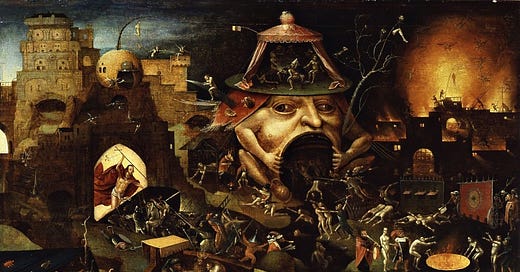


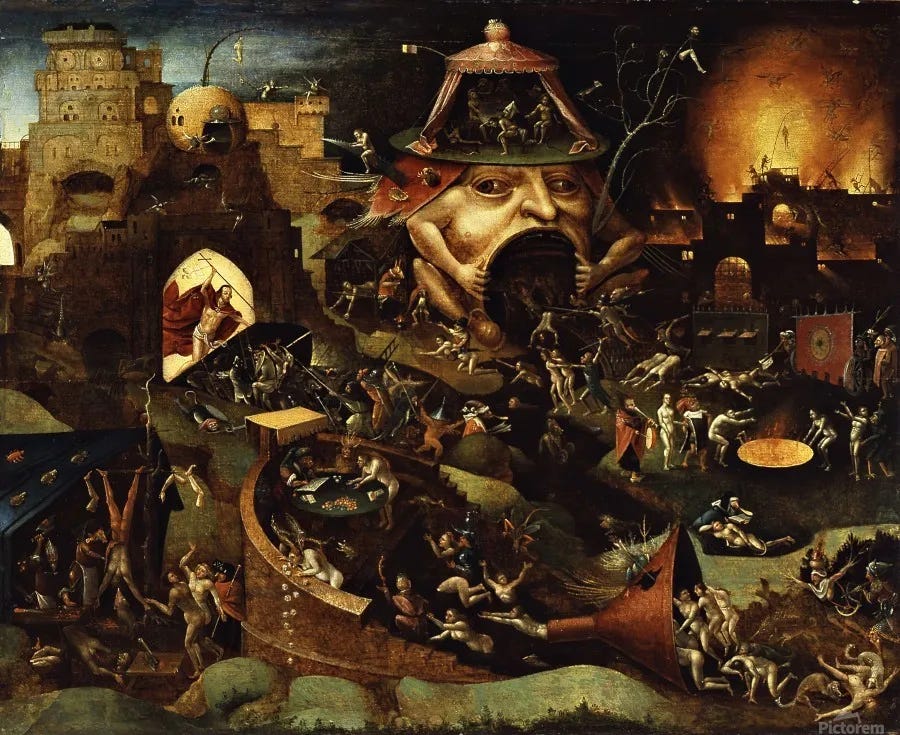
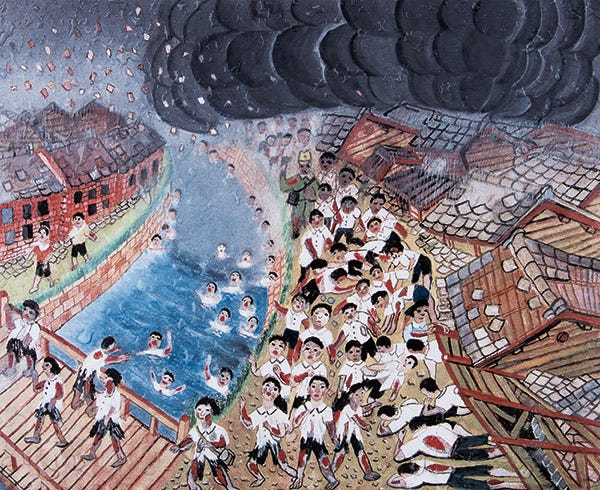
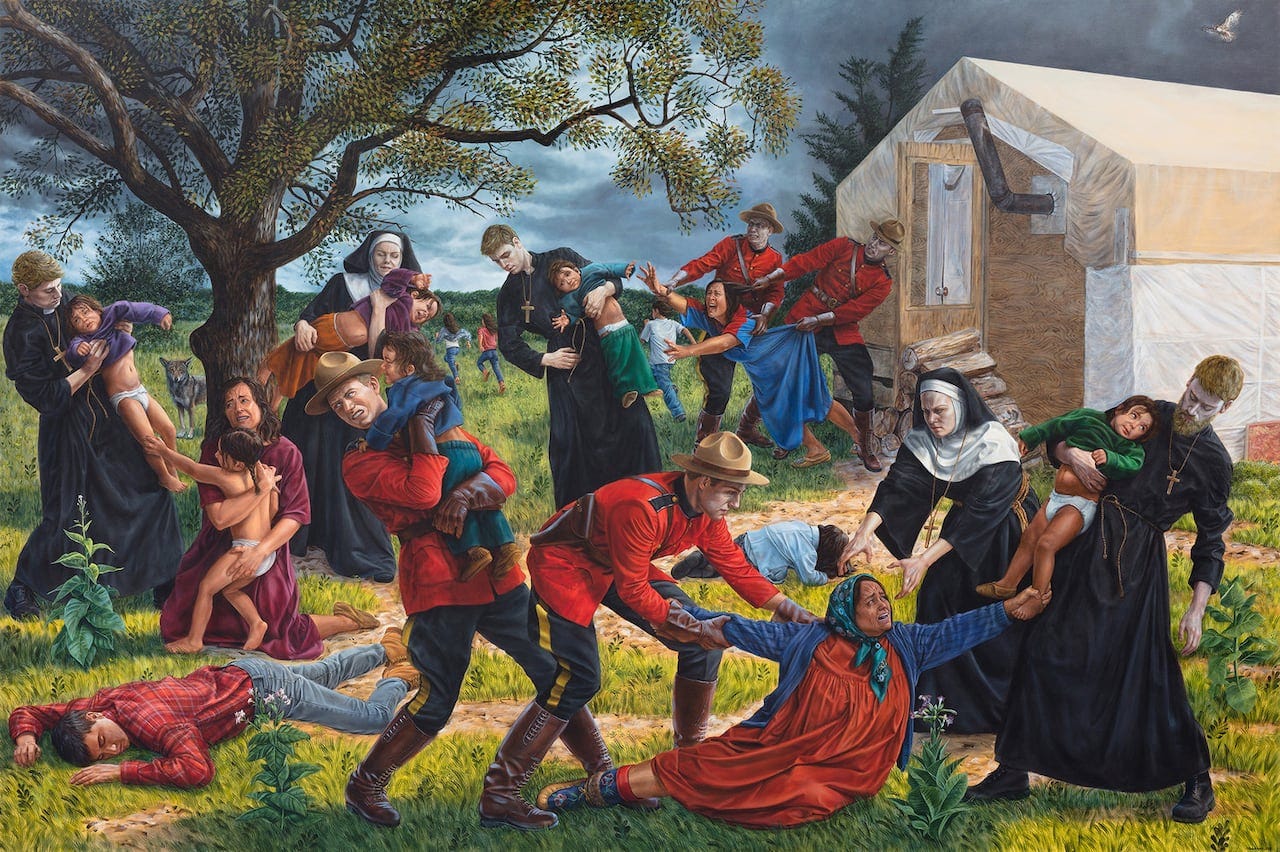
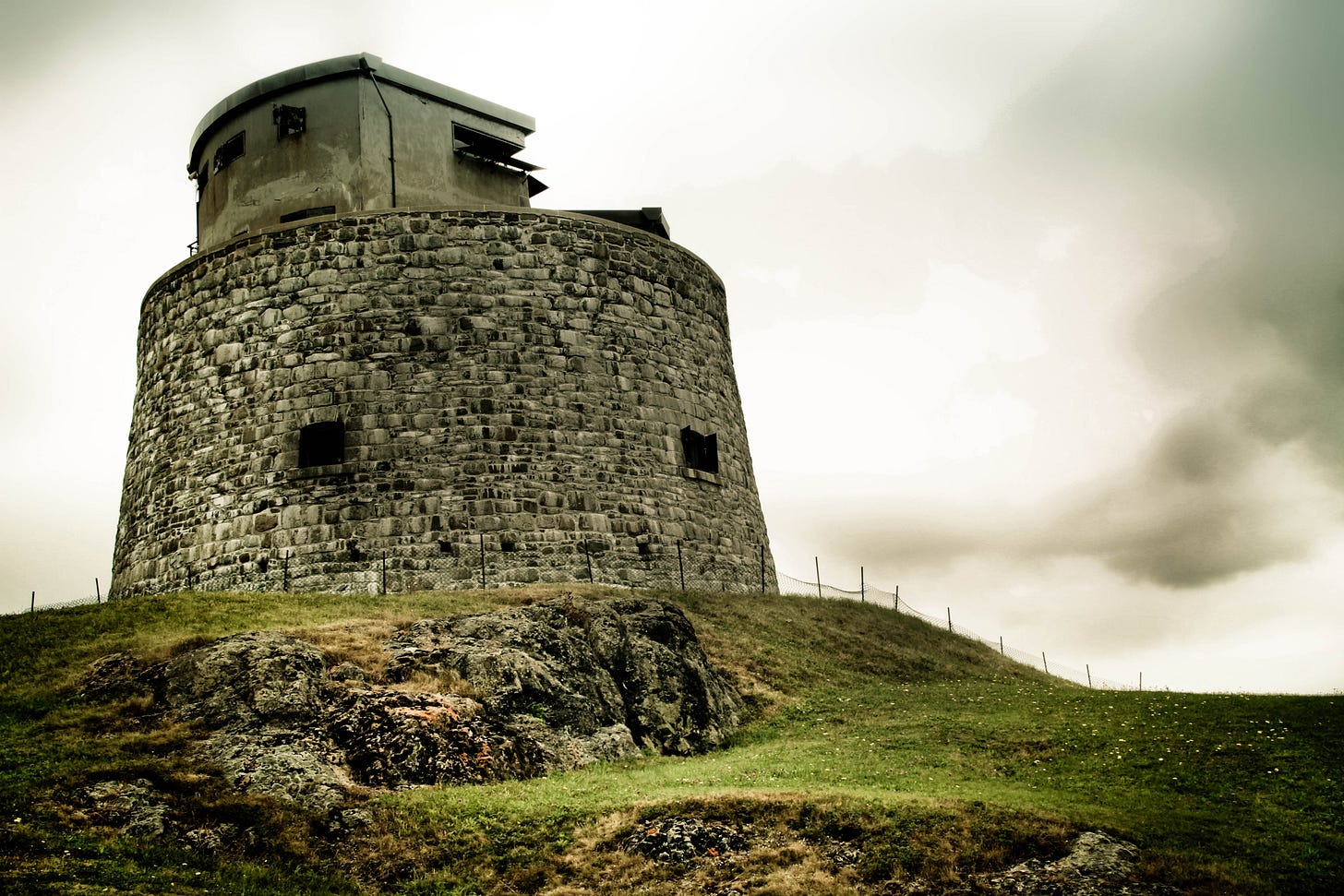
It is extremely hard for me to understand Pynchon if I read him too slowly. I find that you have to take in sentences without understanding them at first, and this is counterintuitive. But, these sentences brought together into paragraphs, pages, episodes, do make more sense with more familiarity. Nonetheless, I feel that in literary fiction it is often the maintenance of a certain level of ambiguity that gives multiplicity of application and interpretation to a text, and, to a degree, power and affect.
With Pynchon's style, I notice the capitalization of certain words for emphasis, like “Evacuation,” and “Most Secret.” Where do you think this comes from? What do you think he is trying to accomplish or imply with it?
I also notice he often cuts himself off mid-sentence, "This well scrubbed day ought to be no worse than any—" I don't have other examples right now but I know there are other instances where it is used to split the meaning of a sentence so that it can go two separate ways, often humorously. Of course there is the novel ending with the sentence cut off as well, though that's hardly a joke.
I don't follow when it comes to the bananas. For me they are not a parallel to any kind of numbing consumption, like the purchase of unnecessary pleasures. They are unnecessary, they are a luxury, but they are not really purchased. Pirate grows them, they are fruit borne of his effort and attention. To me, the rooftop garden is most obviously Pirate's created Eden in the middle of a swamp of death and decay. “These windows that open into another season, however falsely preserved.”
“All these horizontal here, these comrades in arms, look just as rosy as a bunch of dutch peasants dreaming of their certain resurrection in the next few minutes.”
I like this part. This idea of the way people think of war, or think of their place in the war. Like pilgrims, they are on their way to a promised paradise. A Rapture, an Apocalypse of the biblical category, is very like a war, no? The hope of the Chosen, the belief that they are justified, the end of everything, the way life changes completely, the paradise you believe will follow after, how quickly the past shrinks before the importance of the present.
Another characteristic of Pynchon I am intrigued by, he mingles the ugly and the beautiful together, or in some kind of way, things that are sacred and things that are profane. Bodily functions we’d rather not hear described, defecation, the clinical and odious descriptions of sexual functions, erection, ejaculation, etc., details of humanity that we prefer not to have waxed poetic about, our facial pores, bodily odors, etc.. Here, it is the beauty/terror of Pirate Prentice seeing the sunlight hitting the vapor trail of the rocket, juxtaposed against the feeling that he really has to poop. Something to pay attention to while reading maybe. I am reminded of the Robert Penn Warren poem about Theodore Dreiser, “He knew that the filth of self, in order to be loved, must be clad in glory.”
His humor, as well, intrigues me, because I think it is used differently than other comic novelists. I am not able to articulate it very well, but there is a kind of pathos that is only possible when it’s juxtaposed against humorous, ridiculous, silly, juvenile things. And then, against horrors that go beyond what can even be described or imagined. The scenes of Roger and Jessica later in the novel become that much more powerful because of the silliness and the pain that they stand juxtaposed against. Life can become ridiculous and make us laugh, even in the midst of our pain.
“Half-silvered images in a viewfinder,” With the various comparisons and allusions to cinema and filmmaking in the novel, and the lines of squares that separate episodes like the sprocket holes in film stock, I have thought a bit about what a good cinematic version of GR would look like. Bowie’s song goes great with this episode. Have you ever seen Thirty Two Short Films About Glenn Gould? 98 minutes of short, basically independent scenes that coalesce into a whole. I don’t believe a film of GR would ever be made unless cinema evolves into a very different kind of art, but I think 73 short films of Gravity’s Rainbow would be the way to do it, each in some way separate in tone and approach, all fitting into a whole. It would probably be 8 hours long but I’d watch it.
One of the few things I learned in my English undergrad that I take with me when reading is to always think of themes as being two-sided. Looking for the ways that a theme is contrasted by its direct opposite often helps me better understand a work. In this chapter, I see elect/preterite, certainty/uncertainty, sacred/profane, and paradise/annihilation. The ultimate though, I think, for the whole novel, more to come later rather than directly portrayed here, is the basic cause/effect and its reversal in the rocket which you can only hear coming after you’re already dead.
Really nice intro. Would love to do a group read.